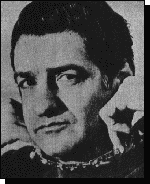Albert Henry DeSalvo (September 3, 1931 - November 25, 1973) was a serial killer active in Boston, Massachusetts in the early 1960s. Between June 14, 1962, and January 4, 1964, thirteen single women between the ages of 19 and 85 in the Boston area were murdered. All thirteen women were murdered in their apartments, strangled with articles of clothing after being sexually assaulted. Without any sign of forced entry into their dwellings, the women apparently either knew their assailant or voluntarily allowed him into their homes.
While the police were not convinced that all of these murders were the work of a single individual, the public believed so. Despite police efforts to solve the case, it was the alleged Strangler who caused his own capture.
On October 27, 1964, a stranger entered a young woman's home posing as a detective. He tied his victim to her bed, proceeded to sexually assault her, and suddenly left, saying "I'm sorry" as he went. The woman's description led police to identify the assailant as Albert Henry DeSalvo and when his photo was published, many women identified him as the man who had assaulted them. Earlier that night, he had posed as a motorist with car trouble and attempted to enter a home in Bridgewater, Massachusetts. The homeowner, future Brockton police chief Richard Sproles, became suspicious, and eventually fired a shotgun at DeSalvo. At this point, DeSalvo was not suspected of being involved with the stranglings. It was only after he was charged with rape that he gave a detailed confession of his activities as the Boston Strangler. However, there was no evidence to substantiate his confession. As such, he stood trial for earlier, unrelated crimes of robbery and sexual offences. DeSalvo was sentenced to life in prison in 1967. He was murdered six years later in the prison infirmary.
Lingering doubts remain as to whether DeSalvo was indeed the Boston Strangler. At the time that he confessed, people who knew him personally did not believe him capable of the vicious crimes (however, it is not uncommon for people who knew a serial killer to never have suspected him to be capable of such violence. In the case of Mary Sullivan, murdered January 4, 1964, at age 19, DNA] and other forensic evidence gathered nearly 40 years later by her nephew Casey Sherman and published in his book A Rose for Mary (2003) suggested that DeSalvo was not responsible for her death. For example, DeSalvo confessed to sexually penetrating her, yet the forensic investigation revealed no evidence of sexual activity. There are also suggestions from DeSalvo himself that he was covering up for another man, the real killer.
DeSalvo was the subject of the 1968 Hollywood film The Boston Strangler, starring Tony Curtis as DeSalvo, and Henry Fonda and George Kennedy as the homicide detectives who apprehend him. The movie was highly fictionalized; it assumed DeSalvo was guilty, and it portrayed him as suffering from multiple personality disorder and committing the murders while in a psychotic state. DeSalvo was never diagnosed with, or even suspected of having, that disorder. DeSalvo was one of the serial killers whose murders were recreated by the killer in the movie Copycat.
Trivia
- The song "Midnight Rambler" by the Rolling Stones (from the album Let It Bleed) was inspired by and mentions the Boston Strangler.
- In 1971, Texas legislator Tom Moore, Jr. introduced a measure to demonstrate the lack of legislative scrutiny. The measure's passage effectively meant that DeSalvo was commended by the Texas House of Representatives as being "officially recognized by the state of Massachusetts for his noted activities and unconventional techniques involving population control and applied psychology."
- British power electronics group Whitehouse have a track called "Dedicated To Albert De Salvo" (album: Buchenwald, 1981)
- Japanese doom metal band Church of Misery has a song titled "Boston Strangler (Albert DeSalvo)" on the album of the same name. The lyrics are from the Strangler's point of view [1].
- the Song "boston strangler" appears on the band Macabre's 1993 album sinister slaughter.
References
- A Rose for Mary ISBN 155553578X
- A Death in Belmont Sebastian Junger ISBN 0393059804
External links
- FBI files (still partly classified)
- Albert DeSalvo - The Boston Strangler?
- The Boston Strangler (Court TV's Crime Library)
- The Boston Strangler
- Article About Sebastian Junger's Book A Death in Belmont TIME Magazine, 04/10/2006.

